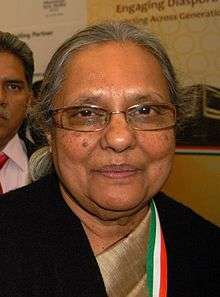Ela Gandhi
| Ela Gandhi | |
|---|---|
 | |
| Born |
1 July 1940 Durban, South Africa |
| Alma mater | University of Natal |
| Occupation | Politician, activist |
| Parent(s) |
Manilal Gandhi Sushila Mashruwala |
Ela Gandhi (born 1 July 1940), granddaughter of Mahatma Gandhi, is a peace activist[1] and was a Member of Parliament in South Africa from 1994 to 2004, where she aligned with the African National Congress (ANC) party representing the Phoenix area of Inanda in the KwaZulu-Natal province. Her parliamentary committee assignments included the Welfare, and Public Enterprises committees as well as the ad hoc committee on Surrogate Motherhood. She was an alternate member of the Justice Committee and served on Theme Committee 5 on Judiciary and Legal Systems.
Early life
Gandhi was born in South Africa to Manilal Gandhi and grew up in an ashram of the Phoenix Settlement near Durban, South Africa.[2] She received her B.A. degree at the former Natal University and later received a B.A. in social science with honors from UNISA.[3] Following graduation, she worked as a social worker with the Verulam Child and Family Welfare Society for 15 years and the Durban Indian Child and Family Welfare Society for five years.[4]
Gandhi served as an executive member of the Natal Organisation of Women from its inception until 1991. Her political affiliations include the Natal Indian Congress, which she served as vice president, the United Democratic Front, Descom Crisis Network, and Inanda Support Committee.[5] During apartheid, Gandhi was banned in 1975 from political activism and subjected to house arrest for a total of nine years. She worked underground for an end to the practice. One of her sons was killed during the struggle against apartheid.[6] She was among the members of the United Democratic Front who met with Nelson Mandela prior to his release from Pollsmoor Prison on February 11, 1990. Prior to the 1994 elections, Gandhi was a member of the Transitional Executive Committee.[7]
Post parliament
After serving in parliament, Gandhi developed a 24-hour program against domestic violence, founded the Gandhi Development Trust, serves as a member of the Religious Affairs Committee, and oversees a monthly newspaper. She also chairs the Mahatma Gandhi Salt March Committee and the Mahatma Gandhi Development Trust.[8] Ela Gandhi served as the Chancellor of Durban University of Technology for several years.
Awards and Recognitions
Ela Gandhi's contribution to politics and society is widely recognised -
- In 2002, she received the Community of Christ International Peace Award.
- In 2007, she was conferred the Padma Bhushan award from the Government of India.[9]
- In 2014, she was awarded the Pravasi Bharatiya Samman - the highest honour for overseas Indians conferred by the President of India.
- In 2014, she was also honoured as a veteran of the Umkhonto we Sizwe. [10]
See also
References
- ↑ "ELA GANDHI". Voices of Resistance. Voices of Resistance. Retrieved 23 May 2012.
- ↑ "A Life Committed to Satyagraha: 2002 International Peace Award Recipient Ela Gandhi". Int'l Peace Award: Community of Christ. Community of Christ. Retrieved 23 May 2012.
- ↑ "Ela Gandhi (July 01, 1940 - )". South Africa: Overcoming Apartheid, Building Democracy. South African History Online. Retrieved 23 May 2012.
- ↑ Tiara Walters (5 June 2010). "Ela Gandhi" (News article (interview)). Times Live. AVUSA, Inc. Retrieved 23 May 2012.
- ↑ "Ela Gandhi". South African History Online. South African History Online. Retrieved 23 May 2012.
- ↑ "A Life Committed to Satyagraha: 2002 International Peace Award Recipient Ela Gandhi". Int'l Peace Award: Community of Christ. Community of Christ. Retrieved 23 May 2012.
- ↑ "Ela Gandhi". South African History Online. South African History Online. Retrieved 23 May 2012.
- ↑ "Durban Living Legend - Ela Gandhi". Ulwazi. http://wiki.ulwazi.org. Retrieved 23 May 2012. External link in
|publisher=(help) - ↑ "Padma Awards" (PDF). Ministry of Home Affairs, Government of India. 2015. Retrieved July 21, 2015.
- ↑ http://www.thehindu.com/news/national/ela-gandhi-honoured-in-south-africa/article5620913.ece
External links
- Interview of Ela Gandhi September 25, 2001
- History of South Africa biography